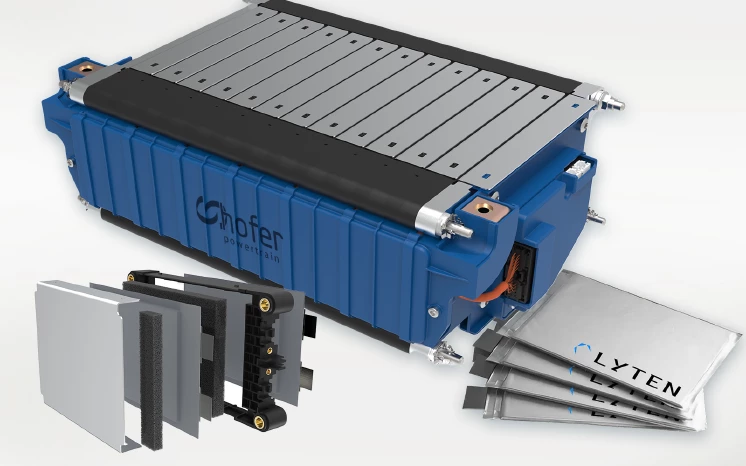Lithium-sulfur (Li-S) technology offers a more sustainable, lighter, and higher-energy-density battery storage solution by eliminating the use of critical materials such as nickel, cobalt, manganese, and graphite. hofer powertrain is currently building a battery module to further progress the potential of this new cell chemistry at the module and pack level.
These cells represent a next generation alternative to existing lithium-ion chemistries. Lyten’s lithium-sulfur delivers significantly higher energy densities while reducing overall weight and enabling a more sustainable use of raw materials. The joint project focuses on delivering the cells’ performance within a module structure, particularly regarding electrical load capacity and cycling stability. According to projections, Lyten’s lithium-sulfur will enable energy densities 2X higher than lithium-ion, including a wider range of a low and high temperature performance.
From a supply chain perspective, the new module offers clear advantages: By eliminating the use of nickel, cobalt, manganese and graphite, Lyten is able to locally source its minerals in the U.S. and EU. Combined with Lyten’s potential for a simplified cell manufacturing process, the project is expected to achieve CO₂ savings of over 60% at industrial scale. The integration of lithium-sulfur into hofer powertrain’s modules represents an important step toward delivering high-performance, safe, and more sustainable battery solutions at scale, with strong potential for applications across a wide range of industries.
As part of the joint project, Lyten provides the lithium-sulfur-based battery cells, while hofer powertrain is responsible for complete system development and integration—from module architecture to functional validation. hofer powertrain’s battery engineering team has transferred the cell chemistry into a modular battery concept specifically designed for pouch cells. The system features a streamlined design that allows for easy cell replacement and addresses all critical aspects of development: mechanical, thermal, and electrical.
This newly developed battery module features a modular architecture designed for applications up to and beyond 800 volts and incorporates hofer powertrain’s Cell Monitoring Unit (CMU), which seamlessly integrates into the architecture and enables precise monitoring at the module level.
Johann Paul Hofer, CEO of hofer powertrain, emphasizes: “Our customers demand technologically robust, future-proof solutions. For decades, we have been delivering unique battery concepts by combining proven technologies with innovative architectures and at the same time, have the capability to quickly implement and validate new cell chemistries like lithium-sulfur at the system level, in a reliable and application-oriented manner. With our extensive development and testing capabilities, the current expansion of our battery and testing centers, and our long-standing expertise in electric powertrains, we create the foundation for bringing innovations to market readiness at an early stage.”
“Demand for lithium-sulfur batteries is skyrocketing as customers seek lighter weight, lower cost batteries built with abundantly available local materials. We are incredibly excited to work together with hofer powertrain and its years of pack and module experience to accelerate adoption of lithium-sulfur. EVs, micromobility, drones, satellites, BESS, and many more applications are all going to benefit from this joint project,” adds Dan Cook, CEO and Co-Founder of Lyten.
The project exemplifies a collaboration where innovation, system expertise, and technological leadership go hand in hand.

